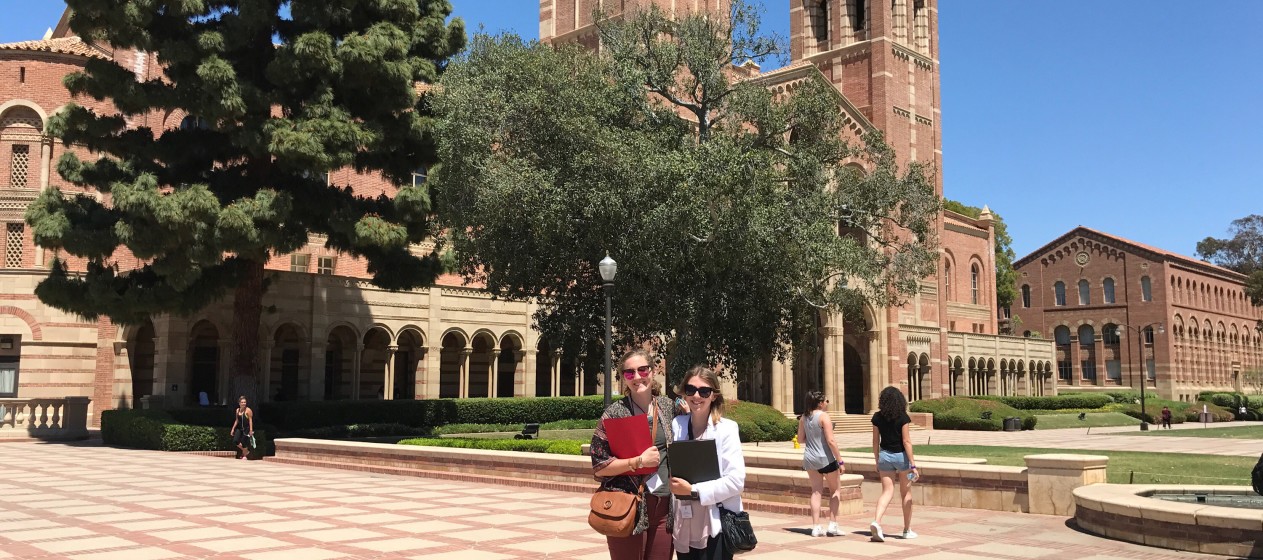FSU Student Journalists Attend First Amendment Conference at UCLA
On Saturday, April 29, Frostburg State University (FSU) journalism students Savannah Neubert and Nicole Leighty attended the West Coast Regional Conference of the Foundation for Individual Rights in Education (FIRE). The conference was held at the Fowler Museum on the campus of the University of California, Los Angeles (UCLA).
FIRE is a Philadelphia-based organization that works to promote the protection of civil liberties on American college and university campuses. The organization prides itself on being a resource and supporter of student journalists. Leighty and Neubert attended the conference as representatives of the Bottom Line (TBL), the independent student news organization of Frostburg State University.
Both students will hold leadership positions on the publication’s editorial board during the 2017-2018 academic year. Leighty will serve as editor-in-chief and Neubert will serve as managing editor, and they decided to attend the conference to gain a better understanding of the rights of free speech and free press on university campuses.
The conference included a series of speeches, discussion groups, and presentations designed to provide attendees with the knowledge and skills needed to defend First Amendment Rights on their respective campuses. In the morning, FIRE President and CEO Greg Lukianoff spoke about the history of the organization. FIRE was founded in 1999 by University of Pennsylvania professor Alan Charles Kors and Boston civil liberties attorney Harvey Silverglate.
In his remarks, Lukianoff discussed some of the organization’s efforts over nearly two decades of existence to advocate and litigate for civil liberties in higher education. These efforts have included public criticism and successful litigation directed towards colleges and universities that restrict the civil liberties of students, faculty, or staff.
Later in the day, conference attendees heard a keynote address from Eugene Volokh, the Gary T. Schwartz Professor of Law at UCLA. Volokh is a well-recognized legal advocate for the protection of First Amendment rights, and focused his remarks on current examples of campus free speech controversies. One noted example was his discussion of recent protests by students of the University of California, Berkeley, against conservative campus speakers. Volokh emphasized the importance of protecting a free, safe, and diverse exchange of opinions on college campuses.
The conference concluded with a series of extended discussions about campus free press and free speech policies, and both Neubert and Leighty found the experience to be incredibly worthwhile.
The incoming editor-in-chief said she is looking forward to using the conference materials to raise awareness for First Amendments rights on the Frostburg campus, saying, “This was a great experience for us to bring back what we learned and implement it on campus and on the Bottom Line staff. We learned a lot about our rights, not only as journalists, but also as students.”
Neubert also felt that the conference provided meaningful knowledge and skills for student journalists, adding, “I learned plenty of new and valuable information that I’m excited to bring back to my classes and the Bottom Line.”
According to the organization’s website, the mission of FIRE “is to defend and sustain individual rights at America’s colleges and universities. These rights include freedom of speech, legal equality, due process, religious liberty, and sanctity of conscience—the essential qualities of individual liberty and dignity. FIRE’s core mission is to protect the unprotected and to educate the public and communities of concerned Americans about the threats to these rights on our campuses and about the means to preserve them.”
One tool used by FIRE to monitor and promote civil liberties is a ranking system of higher education institutions. Each ranking is a reflection of FIRE’s evaluation of the school’s commitment to First Amendment rights on campus. The rankings are color-coded, and Frostburg currently has a “yellow light” distinction.
Per FIRE, this classification is given to an institution “whose policies restrict a more limited amount of protected expression or, by virtue of their vague wording, could too easily be used to restrict protected expression.” Specifically, FIRE’s website lists a limited amount of campus “public forum space” and residence hall flier policies as FSU’s “yellow light policies.” However, several of Frostburg’s conduct polices receive positive “green light” rankings from FIRE.




